
Scan our QR code to stay updated with the recent news and upcoming events.
2023.04.14-2023.06.04
L207, East Beijing Road No.99 (Yifeng Shopping Mall, 2nd Floor)
Curator: Liya Prilipko
The limitless artistic potential of plain paper has been showcased by artists for millennia. The ancient Chinese were the first to use the technique now known as papier-mâché to shape paper into sculptures and press bark fibers into pliable sheets. Craftsmen in Germany and Switzerland have long practiced the delicate art of silhouettes, cutting paper into exquisite two-dimensional scenes. Japanese craftsmen helped define origami and disseminate a culture of paper folding.
Although the fibrous and malleable paper hasn't altered much over time, artists have continued to be inspired by its form to try new techniques and experiments. Memory & Metamorphosis, delves into Sabrina J's obsession with paper and showcases pieces made through radical, frequently unforeseen metamorphoses.
Paper is typically more associated with arts and crafts, but here you can see an entire exhibition of paper-based artworks, that are treated as what they are, which is art.
The exhibition showcases the versatility of paper as an art medium and features pieces that have been cut, shaped, painted, sewn, and even embroidered. It invites us to consider the wide range of aesthetic and formal possibilities that working on paper offers, and transports us into the warm and beautiful sensations that paper gives us. The exhibition is a testament to the fact that paper can be an art form in its own right, rather than simply a material to draw or write on.
Mono No Aware,
or Capturing Life Between Moments in Sabrina's works
“From clay, pots are made,
but it is the emptiness inside them that makes
the essence of the pot.”
-Lao Tse
Sabrina’s latest series of nuanced textured surfaces of paper works invite intimate viewing and extended contemplation. Her creations are the result of a fusion of mind and matter, with a deep respect for the life within the materials, and a transformative state of process and interaction.
Sabrina is an artist who reveres the PROCESS while her creativity thrives in its complexity. “If it is simple, I am not going to do it”, says the artist. Her work is necessarily the outcome of an elaborated multistep process. She delights in taking a complex series of actions until she arrives at the point where she is ready to set her work free, trusting the natural PROCESS of life’s impermanence and evolution. Knowing that the transformation is ongoing and change is the only constant, she exercises the highest level of control over an idea and material only until the point she believes it is time she has to let go, allowing external agents, be they the environmental factors or the creative will of other people, to take over and shape her work further.
Mostly abstract, Sabrina’s artworks strike you with a strong material presence. Finding inspiration in the liberating qualities of the handmade material, making her own paper, and exploring its latent possibilities became one of the central practices of Sabrina’s art-making in recent years. Her flirtatious exploration of the media began in 2011 when she discovered bamboo paper-making in Vietnam. As she lived and traveled around the world, she made several attempts to connect with the medium of paper on a practical and conceptual level. On her way to pursuing the intricacies of the craft in various cultures, she came across and explored the Japanese techniques of washi paper making. However, a formal immersion in the possibilities of the medium and a commitment to paper-making occurred only in 2021.
To create her paper works, Sabrina laboriously follows the steps of paper-making craft from handling the wood fibers, soaking, cooking, and separating them to preparing paper pulp, making glue, and preparing the mixture that will eventually turn into paper once molded and dried. For Sabrina, making her own paper is not merely an act of manipulating raw material that she will eventually turn into a work of art, but each step of the process is the act of experiencing art itself in the daily performance of such balancing feats as controlling and letting go, intervening and taking a step back, doing and being, becoming and unbecoming. The art she masters is in both controlling the medium while at the same time allowing for what is present and active in the material substance itself and the environment surrounding it to determine the outcome. Using the wood fibers to make her paper, as well as the artist’s intimate relationship to the paper’s life cycle, directly influence the shapes, forms, and textures that emerge in her paperwork.
Inspired not only by the properties of the material but by its history and literary tradition, Sabrina incorporates ink in her work. Her works of paper in black and white palette covered a wide range of grays from cold to warm tones, invoking the density and space of light and dark, the changing states of deceptively calm surfaces to turbulent currents.
Crafting paper of various textures, luminosities, and degrees of ink absorption provides a wide spectrum of creative grounds for the artist. Her interventions on paper are at once bold and delicate: she pierces, embroiders, folds, layers, cuts, scratches, pinches, and stitches together paper surfaces. The use of water as an active force in controlling both paper making and ink application, as well as manipulation of various tools to create the texture of the paper, bring an element of chance, surprise, and indeterminacy which has taught the artist to form visions of her work along with the process and not against or despite it.
In her latest paper series, the artist steps away from the black-and-white palette, incorporating a blood-red thread that runs through the pristine white of her paper compositions, birthing a new cycle of works and artistic narratives. Sabrina’s visual vocabulary is minimal, yet rich in associations with her life and themes of memory, story-telling, conversations, and relationships. The red thread either winds through the textured surface as a separate line, penetrating it from side to side, or crosshatches, entangles, and blends with the white to disappear in the surface that contains it, thus reminiscing of people’s conversations, the ones that flow effortlessly and the others that have no endings or beginnings. Her red winding threads also symbolize memories, ones that are lost, and ones that are found. She pays tribute to the life that has been compacted and compressed into layers of experience, memory, and matter preserved.
Casting the dimensional shapes with paper pulp, the group of small sculptures that remind in their forms of various types of vessels, vases, and unfinished bowls, titled “Uncontainable Hope” is one of Sabrina’s first attempts to invite paper into the third dimension. The installation is the artist’s deeply felt response to the beauty of changing seasons. Delicate white eggshell-like containers vary in degree of their completion. Some are fully formed, others appear unfinished, captured in the mid-state, as if showing their respects to the experience of the moment. Sabrina’s honoring of the seasonality of things that shapes her vision and artistic philosophy is expressed to the utmost degree in this work. These paper vessels seem to contain her awareness of impermanence, the transience of all things, and the ephemerality of experience. Sabrina’s “Uncontainable Hope” embodies the artist’s deeply intuitive physical engagement with material processes that manifest the beauty inherent in each encounter. Through the shapes and forms in paper, Sabrina channels her profound awareness of the universe that evokes feelings that are inexplicably deep, mysterious, and hence uncontainable. It is as if the artist is trying to express that the true meaning cannot be revealed without noticing what is absent, and what has not been said or shown. Sabrina’s sculptural innuendo thus suggests that the unshaped gives meaning to solid shapes, and vice-versa. Her artistic philosophy echoes the Chinese 留白 [ liú bái ] intended blank, or Japanese 間 Ma. These aesthetic concepts refer to the void between, through, around, and within all things and to the interval in space and time between moments, objects, people, and their environments. The paper forms of Sabrina’s “Uncontainable Hope portray the pause, the moment full of countless possibilities. The difficulty in depicting such an abstract concept as the feeling of boundlessness is what imbues this work with an indefinable beauty, and an ambiguity that can transcend all cultural boundaries.
Sabrina manages to shift the viewer’s attention from the object itself to the concept, to the process of recognition in the viewer of something in its arrival, passage, and departure, to something that is beyond and out of sight. With her works, she shapes the appreciation of the moment in passing that the Japanese call Mono no Aware (の哀 れ).
Sabrina’s honoring of seasonality and interconnectedness of all things is observed throughout her artistic practice. Her works are records of Memory and Metamorphosis. For Sabrina, each moment of creation, as well as the moments in between the whiteness of the paper and the brush loaded with ink, between the intact surface of the paper and the needle that is ready to pierce it, between the moist pulp and consolidated texture, contain both here and there, before and after, contains a pause full of limitless creative potential. Possessing the power to evoke, rather than to state directly, her work represents the state of infinite possibility.
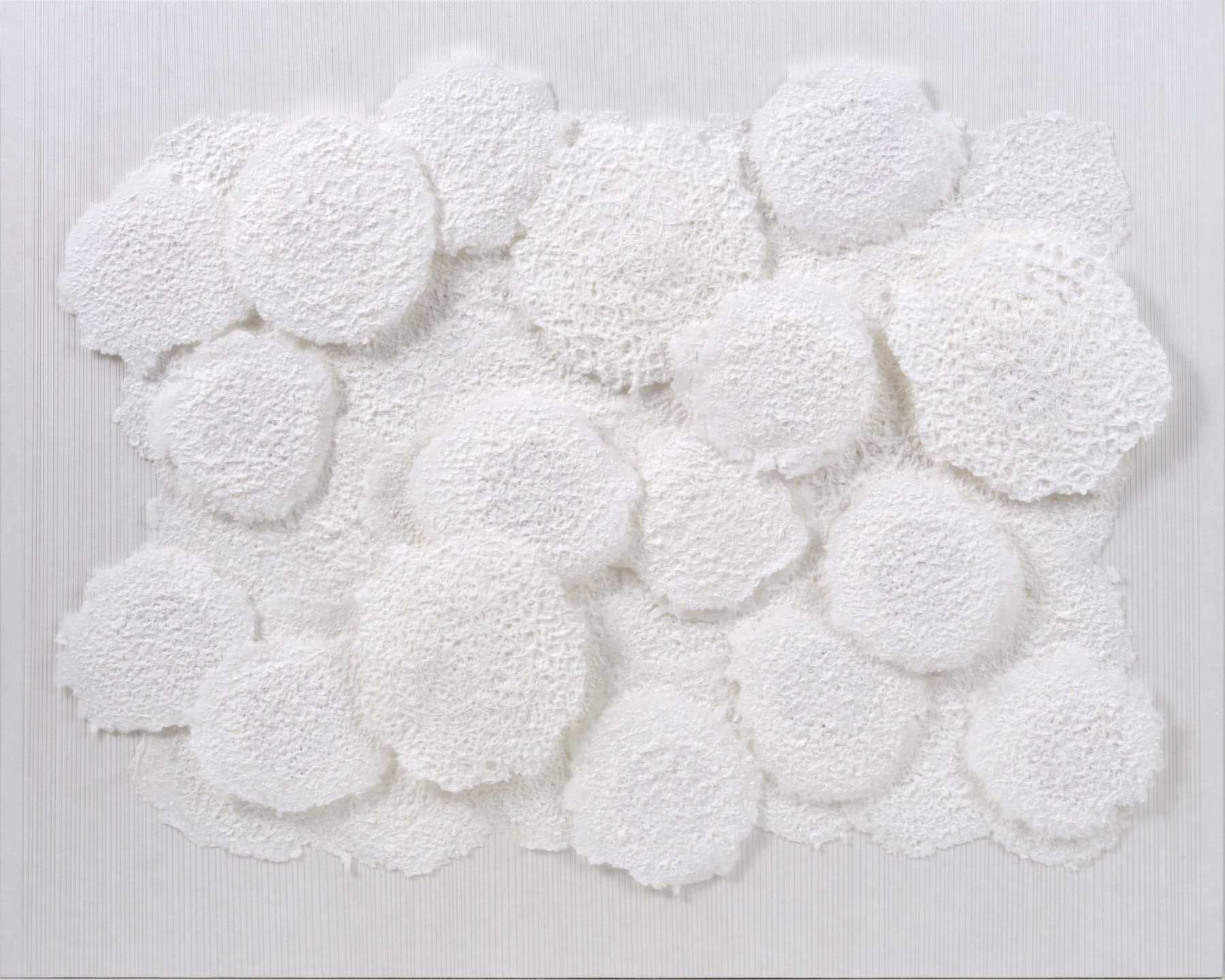
Naively Complex, Hand-crafted pulp fibres disks with white thread surfacing, Size: 81*101*8 cm, 2022
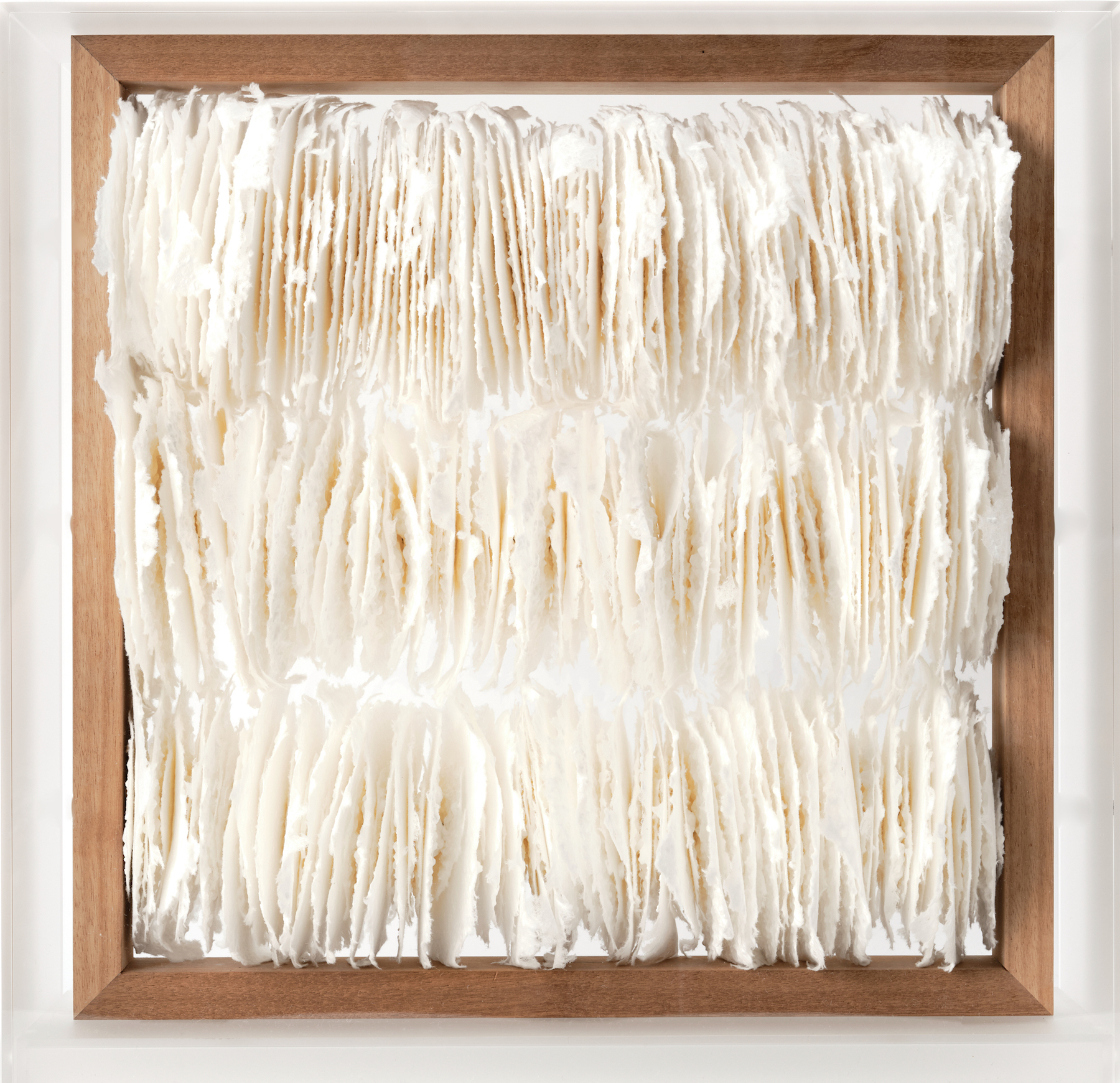
No day is the same, Hand-crafted pulp fibre disks within wooden freestanding frame, 55*54*21 cm, 2023
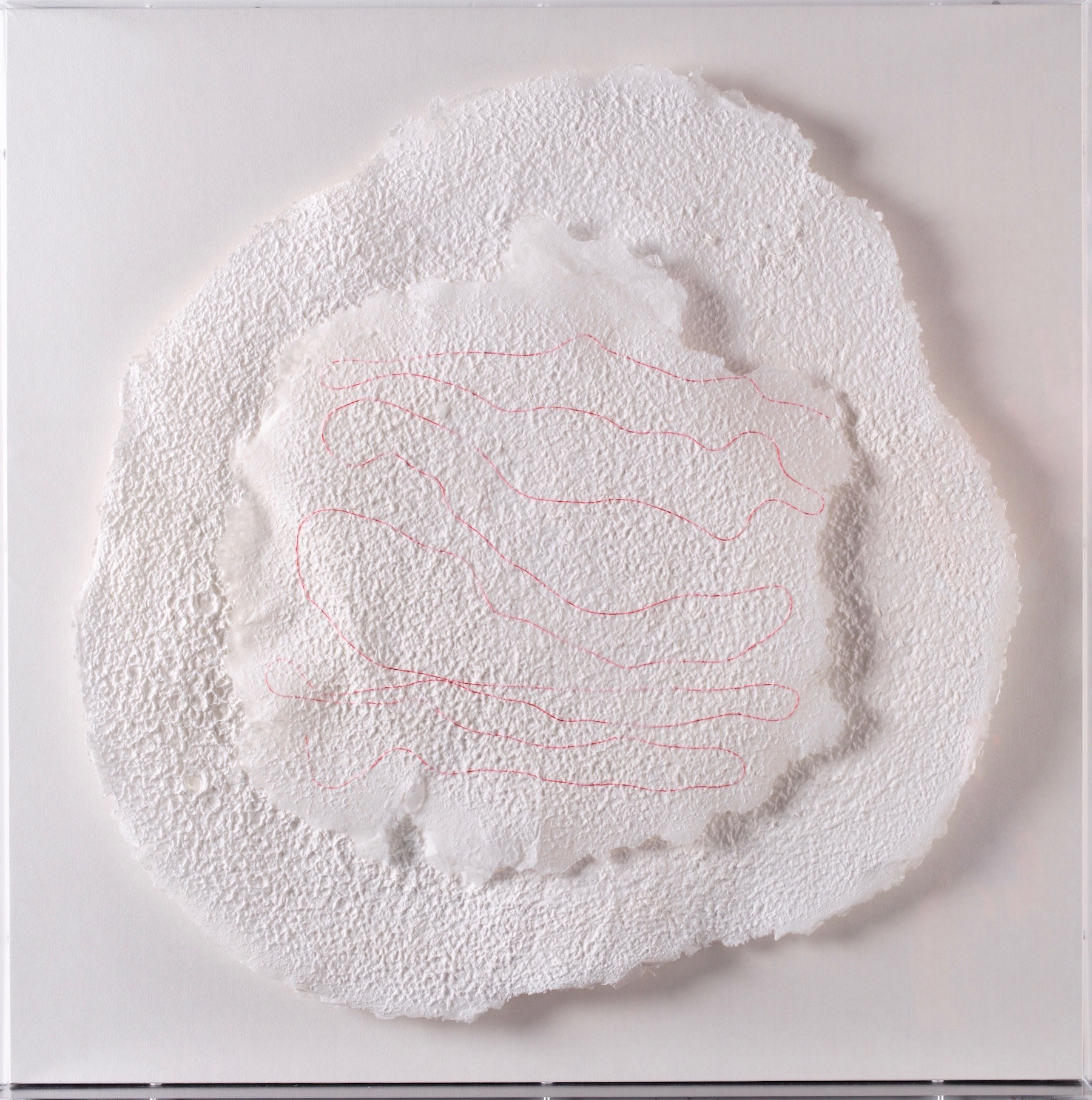
Vague Memories, Hand-crafted pulp fibres with embedded red thread in acrylic box frame, 85*85 cm, 2022

Even if we feel we are going nowhere we are living, Hand-crafted pulp fibres with embedded red thread in acrylic box frame, 58*58*5 cm, 2022

We tend to forget, Hand-crafted pulp fibres with embedded red thread in acrylic box frame, 55*55 cm, 2022
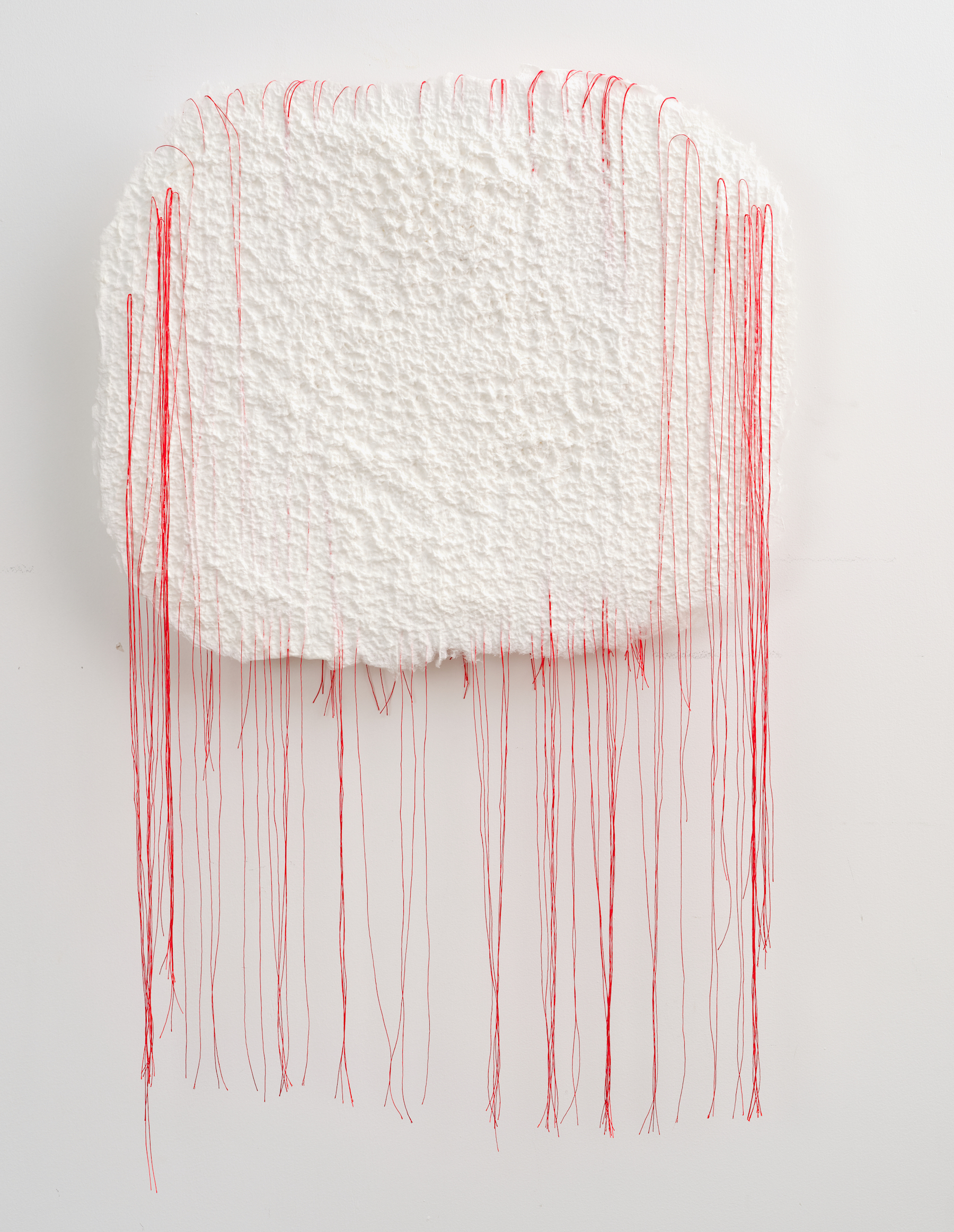
What stood out for you all those years ago?, Hand-crafted pulp fibres with embedded red thread, 56*54 cm, 2022
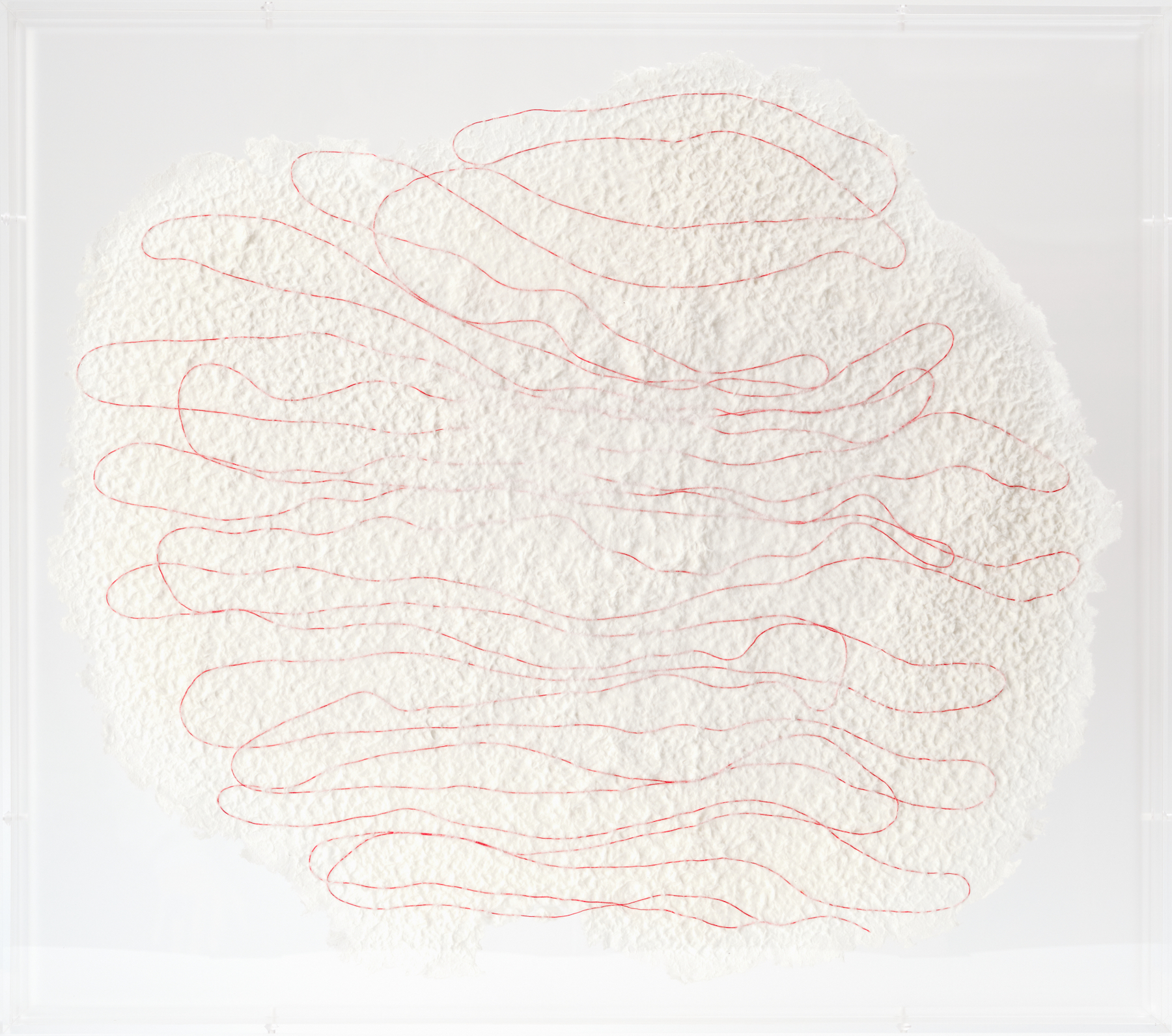
Nothing is that simple but we are making progress, Hand-crafted pulp fibres with embedded red thread in acrylic box frame, 58*66*5 cm, 2022
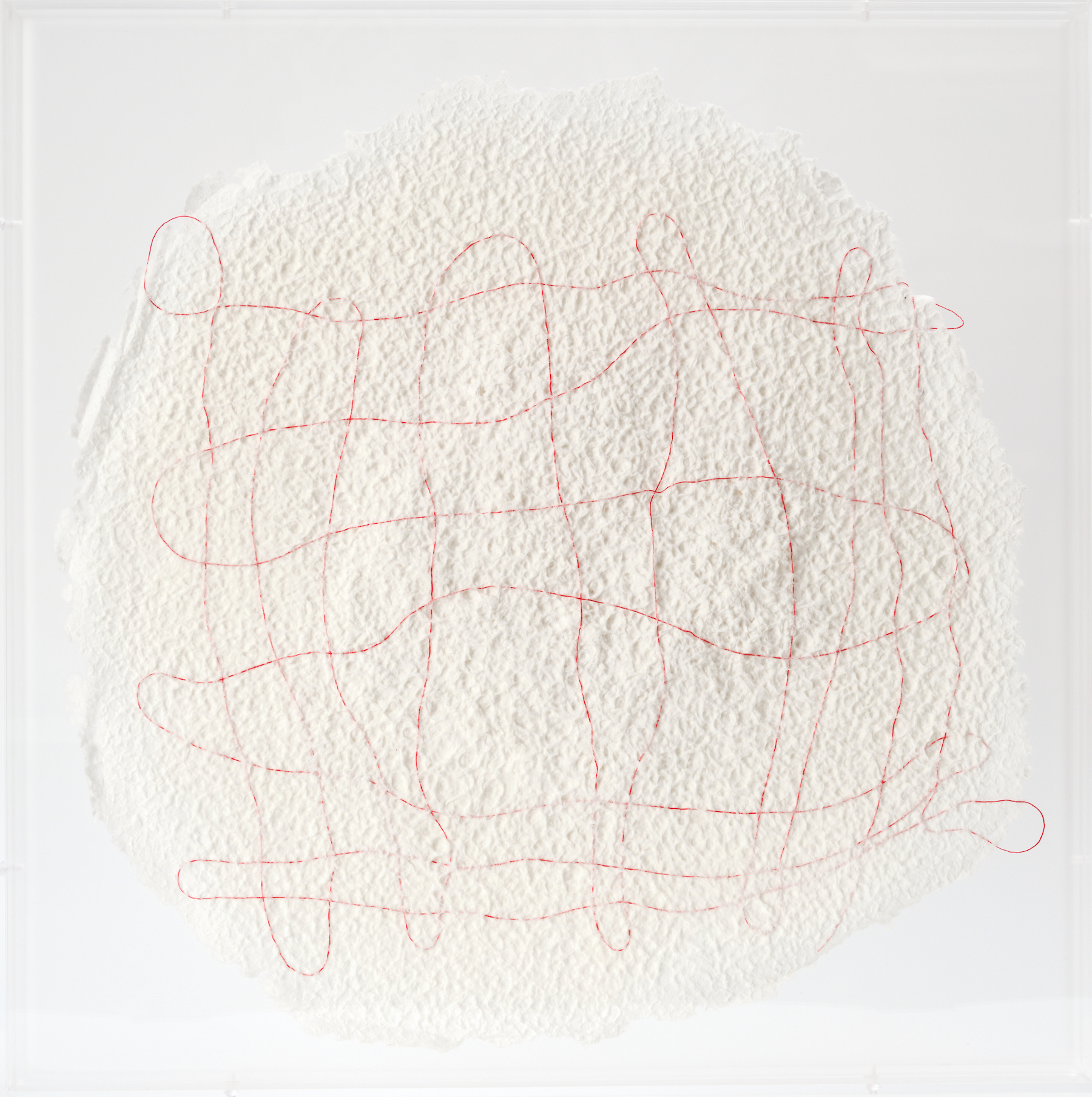
I think I am following you, Hand-crafted pulp fibres with embedded red thread in acrylic box frame, 58*58*5 cm, 2022

It's liberating to let go, Hand-crafted pulp fibres with embedded red thread in acrylic box frame, 74*74*5 cm, 2022

That was the first thing she said, Hand-crafted pulp fibres with embedded red thread in acrylic box frame, 67*63*5.5 cm, 2022
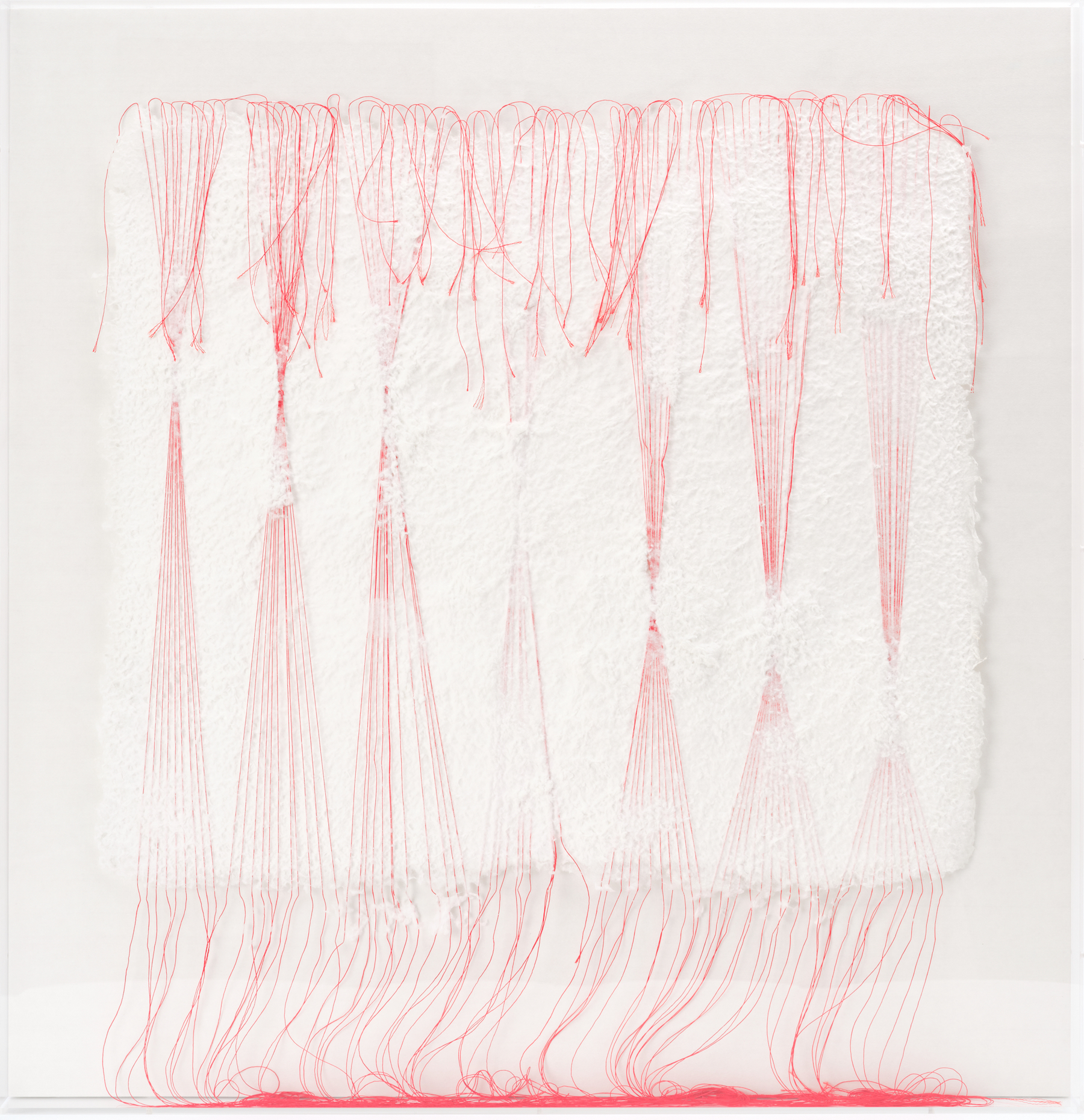
It will only get better from here, Hand-crafted pulp fibres with embedded red thread in acrylic box frame, 89*87*5.5 cm, 2022
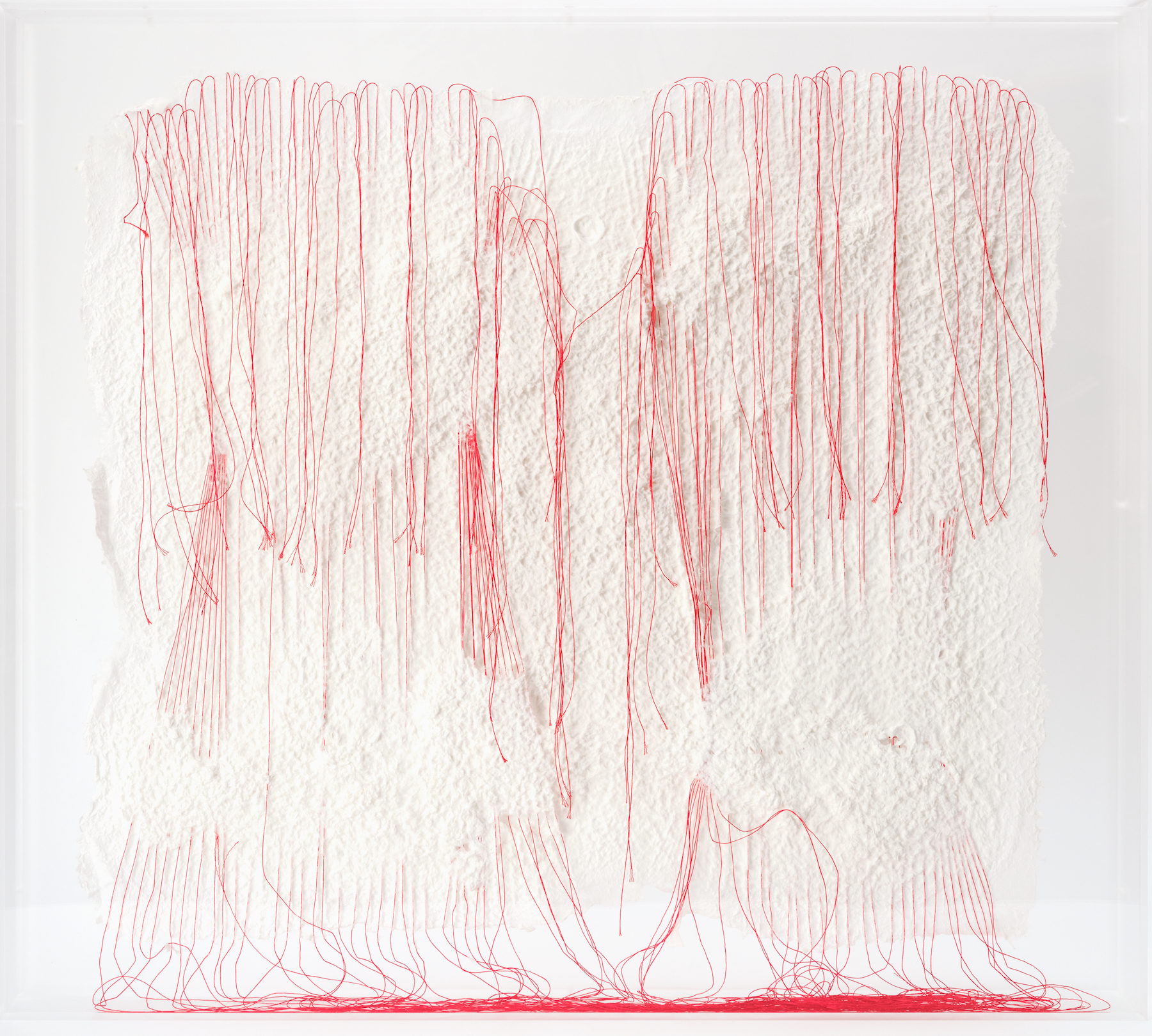
I saw him through the blinds, Hand-crafted pulp fibres with embedded red thread in acrylic box frame, 79*70*7 cm, 2022

Routines are our only safe space, Hand-crafted pulp fibres with embedded red thread in acrylic box frame, 79*72*7 cm, 2022
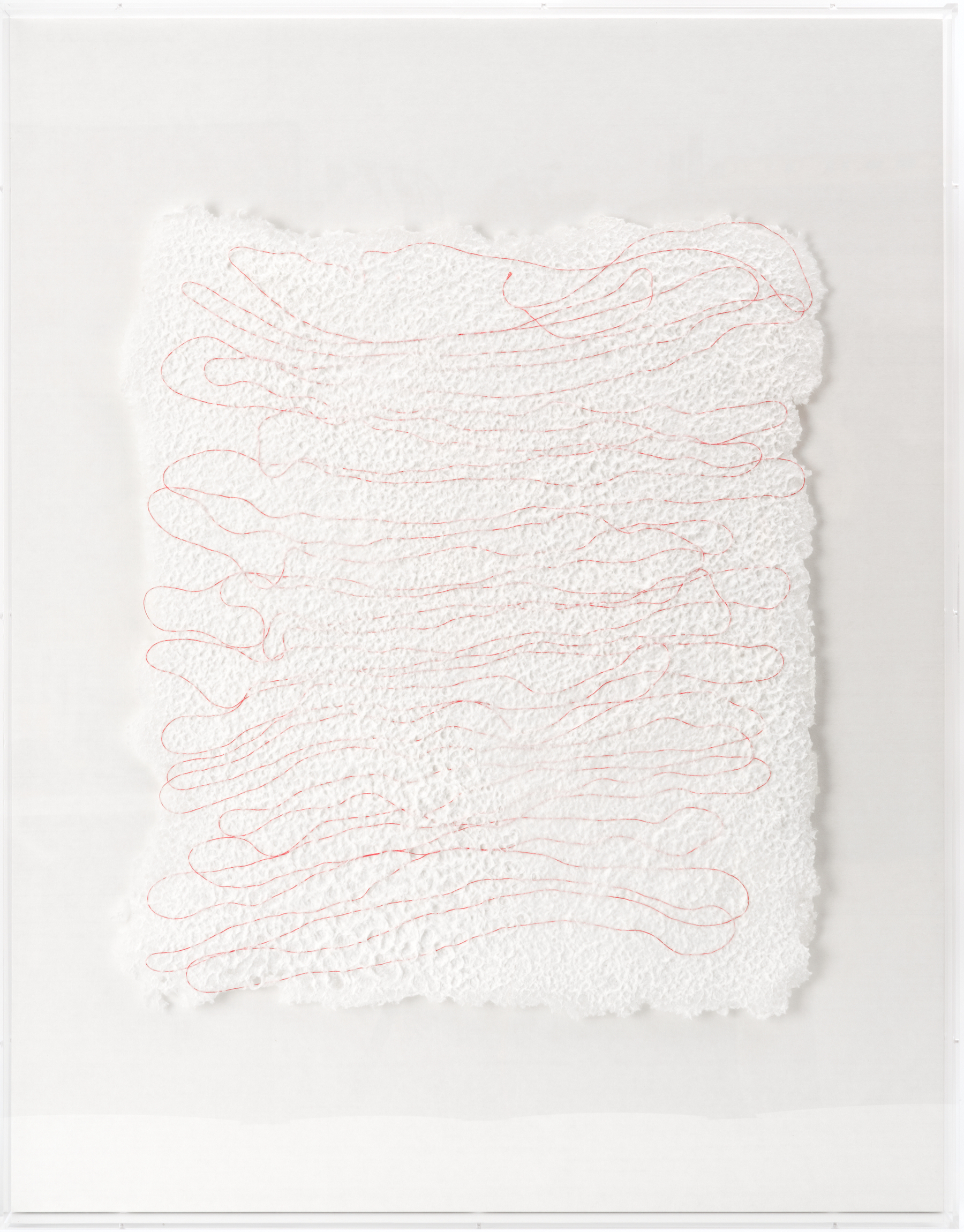
Conversations are never really that straightforward, Hand-crafted pulp fibres with embedded red thread in acrylic box frame, 102*80*5 cm, 2022
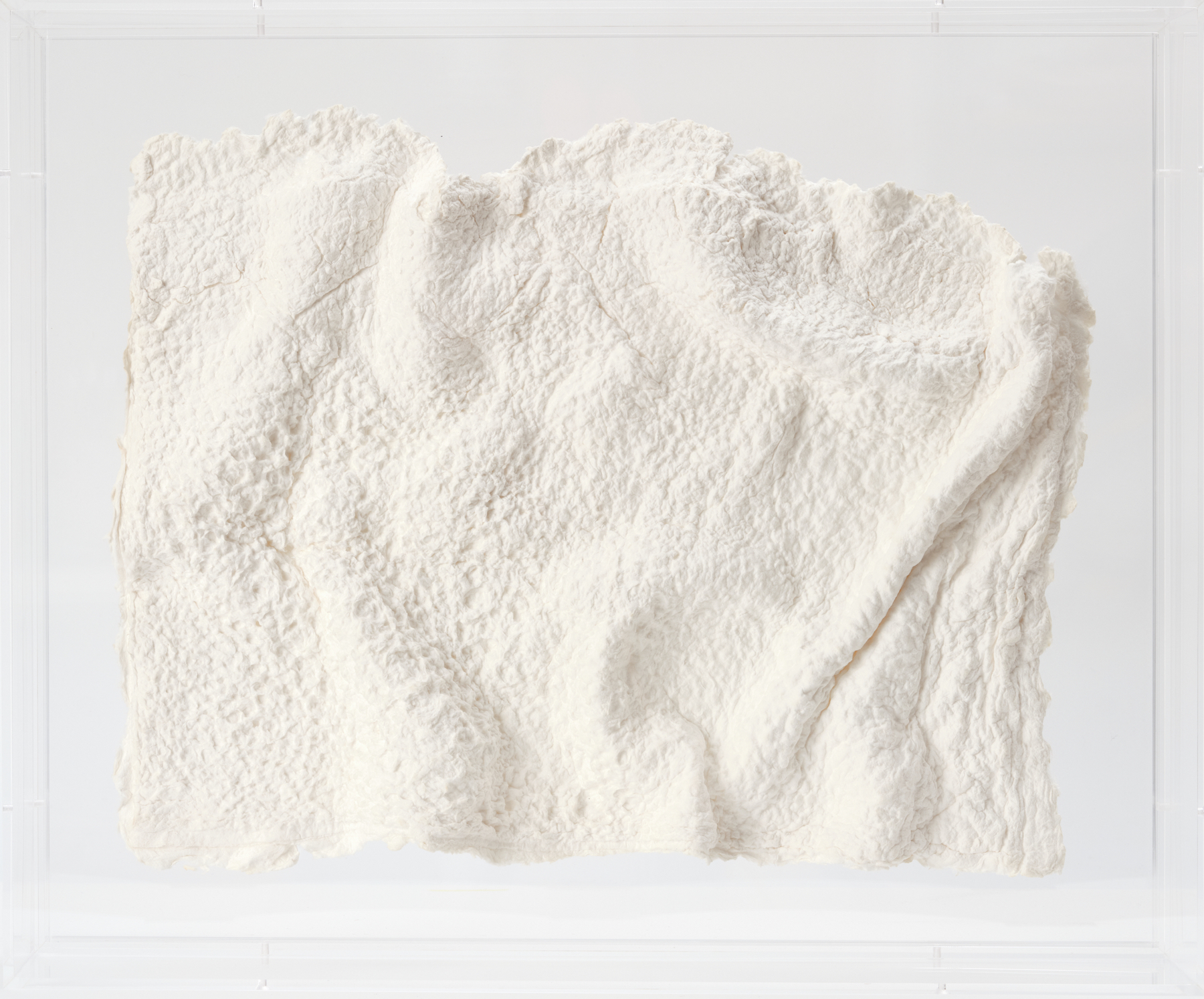
We can sort things out together, Hand-crafted paper using pulp fibres in acrylic box frame, 47*57*9.5 cm, 2022
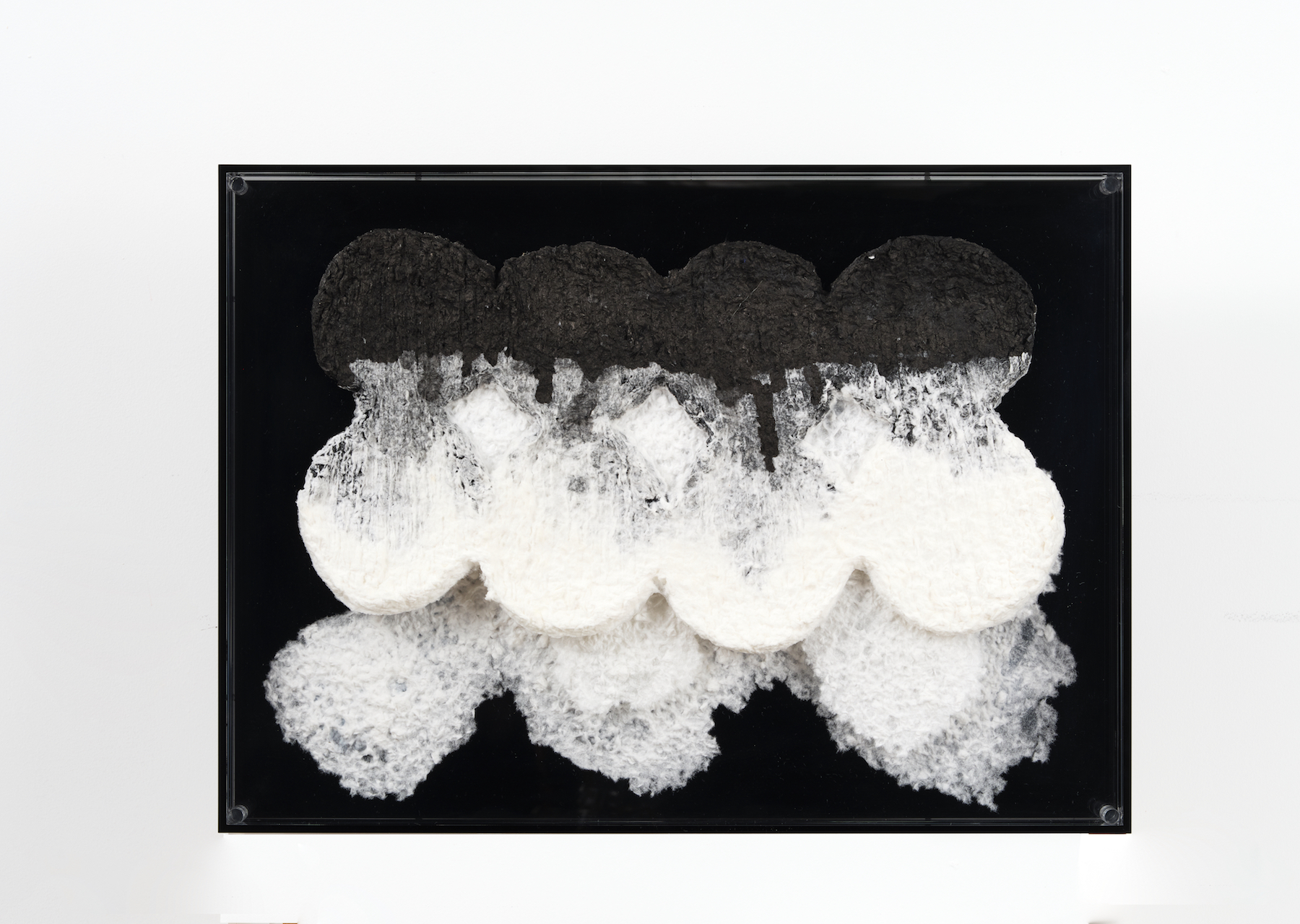
Time and again, Hand-crafted pulp fibres soaked in ink and layered an in acrylic black box frame, 41*56*7 cm, 2022
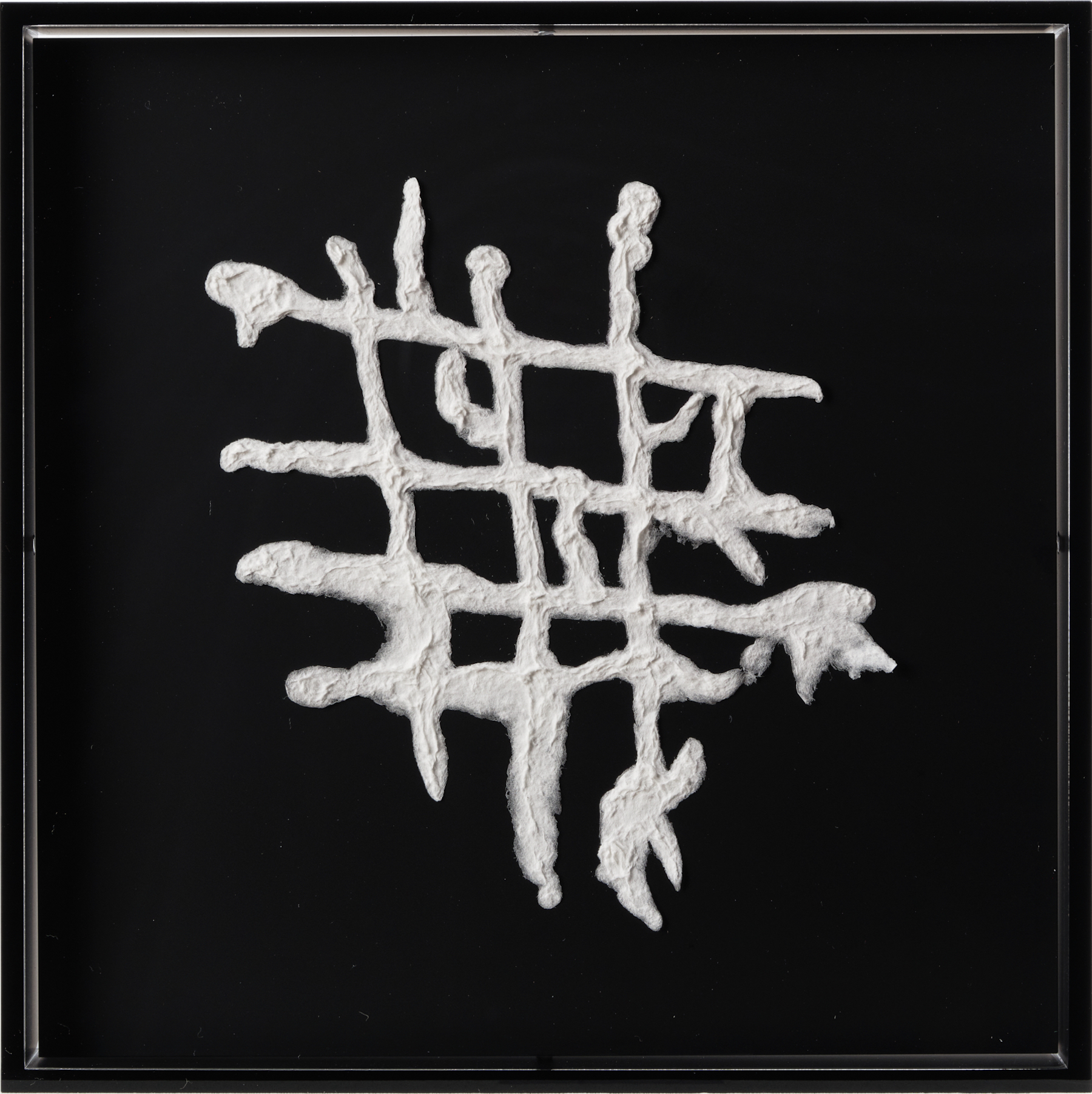
We forget where we came from, Hand-crafted pulp fibres in acrylic black box frame, 23*23*5.5 cm, 2022
Curator: Liya Prilipko
The limitless artistic potential of plain paper has been showcased by artists for millennia. The ancient Chinese were the first to use the technique now known as papier-mâché to shape paper into sculptures and press bark fibers into pliable sheets. Craftsmen in Germany and Switzerland have long practiced the delicate art of silhouettes, cutting paper into exquisite two-dimensional scenes. Japanese craftsmen helped define origami and disseminate a culture of paper folding.
Although the fibrous and malleable paper hasn't altered much over time, artists have continued to be inspired by its form to try new techniques and experiments. Memory & Metamorphosis, delves into Sabrina J's obsession with paper and showcases pieces made through radical, frequently unforeseen metamorphoses.
Paper is typically more associated with arts and crafts, but here you can see an entire exhibition of paper-based artworks, that are treated as what they are, which is art.
The exhibition showcases the versatility of paper as an art medium and features pieces that have been cut, shaped, painted, sewn, and even embroidered. It invites us to consider the wide range of aesthetic and formal possibilities that working on paper offers, and transports us into the warm and beautiful sensations that paper gives us. The exhibition is a testament to the fact that paper can be an art form in its own right, rather than simply a material to draw or write on.
Mono No Aware,
or Capturing Life Between Moments in Sabrina's works
“From clay, pots are made,
but it is the emptiness inside them that makes
the essence of the pot.”
-Lao Tse
Sabrina’s latest series of nuanced textured surfaces of paper works invite intimate viewing and extended contemplation. Her creations are the result of a fusion of mind and matter, with a deep respect for the life within the materials, and a transformative state of process and interaction.
Sabrina is an artist who reveres the PROCESS while her creativity thrives in its complexity. “If it is simple, I am not going to do it”, says the artist. Her work is necessarily the outcome of an elaborated multistep process. She delights in taking a complex series of actions until she arrives at the point where she is ready to set her work free, trusting the natural PROCESS of life’s impermanence and evolution. Knowing that the transformation is ongoing and change is the only constant, she exercises the highest level of control over an idea and material only until the point she believes it is time she has to let go, allowing external agents, be they the environmental factors or the creative will of other people, to take over and shape her work further.
Mostly abstract, Sabrina’s artworks strike you with a strong material presence. Finding inspiration in the liberating qualities of the handmade material, making her own paper, and exploring its latent possibilities became one of the central practices of Sabrina’s art-making in recent years. Her flirtatious exploration of the media began in 2011 when she discovered bamboo paper-making in Vietnam. As she lived and traveled around the world, she made several attempts to connect with the medium of paper on a practical and conceptual level. On her way to pursuing the intricacies of the craft in various cultures, she came across and explored the Japanese techniques of washi paper making. However, a formal immersion in the possibilities of the medium and a commitment to paper-making occurred only in 2021.
To create her paper works, Sabrina laboriously follows the steps of paper-making craft from handling the wood fibers, soaking, cooking, and separating them to preparing paper pulp, making glue, and preparing the mixture that will eventually turn into paper once molded and dried. For Sabrina, making her own paper is not merely an act of manipulating raw material that she will eventually turn into a work of art, but each step of the process is the act of experiencing art itself in the daily performance of such balancing feats as controlling and letting go, intervening and taking a step back, doing and being, becoming and unbecoming. The art she masters is in both controlling the medium while at the same time allowing for what is present and active in the material substance itself and the environment surrounding it to determine the outcome. Using the wood fibers to make her paper, as well as the artist’s intimate relationship to the paper’s life cycle, directly influence the shapes, forms, and textures that emerge in her paperwork.
Inspired not only by the properties of the material but by its history and literary tradition, Sabrina incorporates ink in her work. Her works of paper in black and white palette covered a wide range of grays from cold to warm tones, invoking the density and space of light and dark, the changing states of deceptively calm surfaces to turbulent currents.
Crafting paper of various textures, luminosities, and degrees of ink absorption provides a wide spectrum of creative grounds for the artist. Her interventions on paper are at once bold and delicate: she pierces, embroiders, folds, layers, cuts, scratches, pinches, and stitches together paper surfaces. The use of water as an active force in controlling both paper making and ink application, as well as manipulation of various tools to create the texture of the paper, bring an element of chance, surprise, and indeterminacy which has taught the artist to form visions of her work along with the process and not against or despite it.
In her latest paper series, the artist steps away from the black-and-white palette, incorporating a blood-red thread that runs through the pristine white of her paper compositions, birthing a new cycle of works and artistic narratives. Sabrina’s visual vocabulary is minimal, yet rich in associations with her life and themes of memory, story-telling, conversations, and relationships. The red thread either winds through the textured surface as a separate line, penetrating it from side to side, or crosshatches, entangles, and blends with the white to disappear in the surface that contains it, thus reminiscing of people’s conversations, the ones that flow effortlessly and the others that have no endings or beginnings. Her red winding threads also symbolize memories, ones that are lost, and ones that are found. She pays tribute to the life that has been compacted and compressed into layers of experience, memory, and matter preserved.
Casting the dimensional shapes with paper pulp, the group of small sculptures that remind in their forms of various types of vessels, vases, and unfinished bowls, titled “Uncontainable Hope” is one of Sabrina’s first attempts to invite paper into the third dimension. The installation is the artist’s deeply felt response to the beauty of changing seasons. Delicate white eggshell-like containers vary in degree of their completion. Some are fully formed, others appear unfinished, captured in the mid-state, as if showing their respects to the experience of the moment. Sabrina’s honoring of the seasonality of things that shapes her vision and artistic philosophy is expressed to the utmost degree in this work. These paper vessels seem to contain her awareness of impermanence, the transience of all things, and the ephemerality of experience. Sabrina’s “Uncontainable Hope” embodies the artist’s deeply intuitive physical engagement with material processes that manifest the beauty inherent in each encounter. Through the shapes and forms in paper, Sabrina channels her profound awareness of the universe that evokes feelings that are inexplicably deep, mysterious, and hence uncontainable. It is as if the artist is trying to express that the true meaning cannot be revealed without noticing what is absent, and what has not been said or shown. Sabrina’s sculptural innuendo thus suggests that the unshaped gives meaning to solid shapes, and vice-versa. Her artistic philosophy echoes the Chinese 留白 [ liú bái ] intended blank, or Japanese 間 Ma. These aesthetic concepts refer to the void between, through, around, and within all things and to the interval in space and time between moments, objects, people, and their environments. The paper forms of Sabrina’s “Uncontainable Hope portray the pause, the moment full of countless possibilities. The difficulty in depicting such an abstract concept as the feeling of boundlessness is what imbues this work with an indefinable beauty, and an ambiguity that can transcend all cultural boundaries.
Sabrina manages to shift the viewer’s attention from the object itself to the concept, to the process of recognition in the viewer of something in its arrival, passage, and departure, to something that is beyond and out of sight. With her works, she shapes the appreciation of the moment in passing that the Japanese call Mono no Aware (の哀 れ).
Sabrina’s honoring of seasonality and interconnectedness of all things is observed throughout her artistic practice. Her works are records of Memory and Metamorphosis. For Sabrina, each moment of creation, as well as the moments in between the whiteness of the paper and the brush loaded with ink, between the intact surface of the paper and the needle that is ready to pierce it, between the moist pulp and consolidated texture, contain both here and there, before and after, contains a pause full of limitless creative potential. Possessing the power to evoke, rather than to state directly, her work represents the state of infinite possibility.